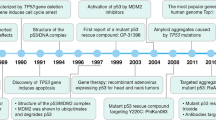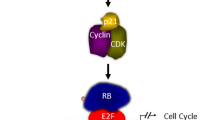Abstract
MDM2 is a key ubiquitin E3 ligase for p53 and its activity is critically regulated by a set of modulators, including ARF, p300, YY1 and recently by gankyrin, an oncoprotein frequently overexpressed in human heptocellular carcinomas. We have previously shown that MDM2 binds to and promotes retinoblastoma protein (Rb) degradation. Here we show that Rb inhibits MDM2 E3 ligase activity resulting in stabilization of p53. In addition, we demonstrated that Rb inhibits MDM2-mediated p53 ubiquitination in a gankyrin-dependent manner and the Rb–gankyrin interaction is critical for Rb-induced p53 stabilization. Furthermore, acute ablation of Rb facilitates gankyrin-mediated p53 destabilization, and desensitizes cancer cells for chemotherapy-induced apoptosis. These results indicate that Rb antagonizes gankyrin to inhibit MDM2-mediate p53 ubiquitination in cancer cells and suggest that the status of both p53 and Rb is important for efficacy of cancer chemotherapy.
This is a preview of subscription content, access via your institution
Access options
Subscribe to this journal
Receive 50 print issues and online access
$259.00 per year
only $5.18 per issue
Buy this article
- Purchase on Springer Link
- Instant access to full article PDF
Prices may be subject to local taxes which are calculated during checkout







Similar content being viewed by others
References
Argentini M, Barboule N, Wasylyk B . (2001). The contribution of the acidic domain of MDM2 to p53 and MDM2 stability. Oncogene 20: 1267–1275.
Beroud C, Soussi T . (1998). p53 gene mutation: software and database. Nucleic Acids Res 26: 200–204.
Bond GL, Hu W, Levine AJ . (2005). MDM2 is a central node in the p53 pathway: 12 years and counting. Curr Cancer Drug Targets 5: 3–8.
Classon M, Harlow E . (2002). The retinoblastoma tumour suppressor in development and cancer. Nat Rev Cancer 2: 910–917.
Cordon-Cardo C, Zhang ZF, Dalbagni G, Drobnjak M, Charytonowicz E, Hu SX et al. (1997). Cooperative effects of p53 and pRB alterations in primary superficial bladder tumors. Cancer Res 57: 1217–1221.
Dawson S, Higashitsuji H, Wilkinson AJ, Fujita J, Mayer RJ . (2006). Gankyrin: a new oncoprotein and regulator of pRb and p53. Trends Cell Biol 16: 229–233.
de Bruin A, Wu L, Saavedra HI, Wilson P, Yang Y, Rosol TJ et al. (2003). Rb function in extraembryonic lineages suppresses apoptosis in the CNS of Rb-deficient mice. Proc Natl Acad Sci USA 100: 6546–6551.
Dick FA, Dyson N . (2003). pRB contains an E2F1-specific binding domain that allows E2F1-induced apoptosis to be regulated separately from other E2F activities. Mol Cell 12: 639–649.
Gotz C, Kartarius S, Scholtes P, Nastainczyk W, Montenarh M . (1999). Identification of a CK2 phosphorylation site in mdm2. Eur J Biochem 266: 493–501.
Grossman SR, Deato ME, Brignone C, Chan HM, Kung AL, Tagami H et al. (2003). Polyubiquitination of p53 by a ubiquitin ligase activity of p300. Science 300: 342–344.
Grossman SR, Perez M, Kung AL, Joseph M, Mansur C, Xiao ZX et al. (1998). p300/MDM2 complexes participate in MDM2-mediated p53 degradation. Mol Cell 2: 405–415.
Haupt Y, Maya R, Kazaz A, Oren M . (1997). Mdm2 promotes the rapid degradation of p53. Nature 387: 296–299.
Higashitsuji H, Itoh K, Nagao T, Dawson S, Nonoguchi K, Kido T et al. (2000). Reduced stability of retinoblastoma protein by gankyrin, an oncogenic ankyrin-repeat protein overexpressed in hepatomas. Nat Med 6: 96–99.
Higashitsuji H, Itoh K, Sakurai T, Nagao T, Sumitomo Y, Masuda T et al. (2005). The oncoprotein gankyrin binds to MDM2/HDM2, enhancing ubiquitylation and degradation of p53. Cancer Cell 8: 75–87.
Hjerrild M, Milne D, Dumaz N, Hay T, Issinger OG, Meek D . (2001). Phosphorylation of murine double minute clone 2 (MDM2) protein at serine-267 by protein kinase CK2 in vitro and in cultured cells. Biochem J 355: 347–356.
Hsieh JK, Chan FS, O'Connor DJ, Mittnacht S, Zhong S, Lu X . (1999). RB regulates the stability and the apoptotic function of p53 via MDM2. Mol Cell 3: 181–193.
Kawai H, Wiederschain D, Yuan ZM . (2003). Critical contribution of the MDM2 acidic domain to p53 ubiquitination. Mol Cell Biol 23: 4939–4947.
Kubbutat MH, Jones SN, Vousden KH . (1997). Regulation of p53 stability by Mdm2. Nature 387: 299–303.
Kulikov R, Boehme KA, Blattner C . (2005). Glycogen synthase kinase 3-dependent phosphorylation of Mdm2 regulates p53 abundance. Mol Cell Biol 25: 7170–7180.
Kulikov R, Winter M, Blattner C . (2006). Binding of p53 to the central domain of Mdm2 is regulated by phosphorylation. J Biol Chem 281: 28575–28583.
Lipinski MM, Macleod KF, Williams BO, Mullaney TL, Crowley D, Jacks T . (2001). Cell-autonomous and non-cell-autonomous functions of the Rb tumor suppressor in developing central nervous system. EMBO J 20: 3402–3413.
Ma J, Martin JD, Zhang H, Auger KR, Ho TF, Kirkpatrick RB et al. (2006). A second p53 binding site in the central domain of Mdm2 is essential for p53 ubiquitination. Biochemistry 45: 9238–9245.
Meulmeester E, Frenk R, Stad R, de Graaf P, Marine JC, Vousden KH et al. (2003). Critical role for a central part of Mdm2 in the ubiquitylation of p53. Mol Cell Biol 23: 4929–4938.
Oren M . (2003). Decision making by p53: life, death and cancer. Cell Death Differ 10: 431–442.
Pomerantz J, Schreiber-Agus N, Liegeois NJ, Silverman A, Alland L, Chin L et al. (1998). The Ink4a tumor suppressor gene product, p19Arf, interacts with MDM2 and neutralizes MDM2's inhibition of p53. Cell 92: 713–723.
Sdek P, Ying H, Chang DL, Qiu W, Zheng H, Touitou R et al. (2005). MDM2 promotes proteasome-dependent ubiquitin-independent degradation of retinoblastoma protein. Mol Cell 20: 699–708.
Sdek P, Ying H, Zheng H, Margulis A, Tang X, Tian K et al. (2004). The central acidic domain of MDM2 is critical in inhibition of retinoblastoma protein-mediated suppression of E2F and cell growth. J Biol Chem 279: 53317–53322.
Sherr CJ . (2004). Principles of tumor suppression. Cell 116: 235–246.
Sherr CJ, McCormick F . (2002). The RB and p53 pathways in cancer. Cancer Cell 2: 103–112.
Stevaux O, Dyson NJ . (2002). A revised picture of the E2F transcriptional network and RB function. Curr Opin Cell Biol 14: 684–691.
Sui G, Affar el B, Shi Y, Brignone C, Wall NR, Yin P et al. (2004). Yin Yang 1 is a negative regulator of p53. Cell 117: 859–872.
Uchida C, Miwa S, Kitagawa K, Hattori T, Isobe T, Otani S et al. (2005). Enhanced Mdm2 activity inhibits pRB function via ubiquitin-dependent degradation. EMBO J 24: 160–169.
Vogelstein B, Kinzler KW . (2004). Cancer genes and the pathways they control. Nat Med 10: 789–799.
Wang C, Ivanov A, Chen L, Fredericks WJ, Seto E, Rauscher III FJ et al. (2005). MDM2 interaction with nuclear corepressor KAP1 contributes to p53 inactivation. EMBO J 24: 3279–3290.
Weber JD, Taylor LJ, Roussel MF, Sherr CJ, Bar-Sagi D . (1999). Nucleolar Arf sequesters Mdm2 and activates p53. Nat Cell Biol 1: 20–26.
Wu L, de Bruin A, Saavedra HI, Starovic M, Trimboli A, Yang Y et al. (2003). Extra-embryonic function of Rb is essential for embryonic development and viability. Nature 421: 942–947.
Xiao ZX, Chen J, Levine A, Modjtahedi N, Xing J, Sellers W et al. (1995). Interaction between the retinoblastoma protein and the oncoprotein MDM2. Nature 375: 694–698.
Xu HJ, Cagle PT, Hu SX, Li J, Benedict WF . (1996). Altered retinoblastoma and p53 protein status in non-small cell carcinoma of the lung: potential synergistic effects on prognosis. Clin Cancer Res 2: 1169–1176.
Zhang Y, Wolf GW, Bhat K, Jin A, Allio T, Burkhart WA et al. (2003). Ribosomal protein L11 negatively regulates oncoprotein MDM2 and mediates a p53-dependent ribosomal-stress checkpoint pathway. Mol Cell Biol 23: 8902–8912.
Zhang Y, Xiong Y, Yarbrough WG . (1998). ARF promotes MDM2 degradation and stabilizes p53: ARF-INK4a locus deletion impairs both the Rb and p53 tumor suppression pathways. Cell 92: 725–734.
Acknowledgements
We thank Dr Yang Shi, Dr Nick Dyson and Dr Steve Grossman for plasmids. We are grateful to many stimulating discussions from members of Xiao's group. This work was supported by NIH grants CA79804 and GM70017 to ZX X.
Author information
Authors and Affiliations
Corresponding author
Additional information
Supplementary Information accompanies the paper on the Oncogene website (http://www.nature.com/onc)
Rights and permissions
About this article
Cite this article
Qiu, W., Wu, J., Walsh, E. et al. Retinoblastoma protein modulates gankyrin–MDM2 in regulation of p53 stability and chemosensitivity in cancer cells. Oncogene 27, 4034–4043 (2008). https://doi.org/10.1038/onc.2008.43
Received:
Revised:
Accepted:
Published:
Issue Date:
DOI: https://doi.org/10.1038/onc.2008.43
Keywords
This article is cited by
-
Gankyrin inhibits ferroptosis through the p53/SLC7A11/GPX4 axis in triple-negative breast cancer cells
Scientific Reports (2023)
-
Testis specific Y-like 5: gene expression, methylation and implications for drug sensitivity in prostate carcinoma
BMC Cancer (2017)
-
Gankyrin as a potential therapeutic target for cancer
Investigational New Drugs (2017)
-
Discovery of a small-molecule binder of the oncoprotein gankyrin that modulates gankyrin activity in the cell
Scientific Reports (2016)
-
Gankyrin facilitates follicle-stimulating hormone-driven ovarian cancer cell proliferation through the PI3K/AKT/HIF-1α/cyclin D1 pathway
Oncogene (2016)



